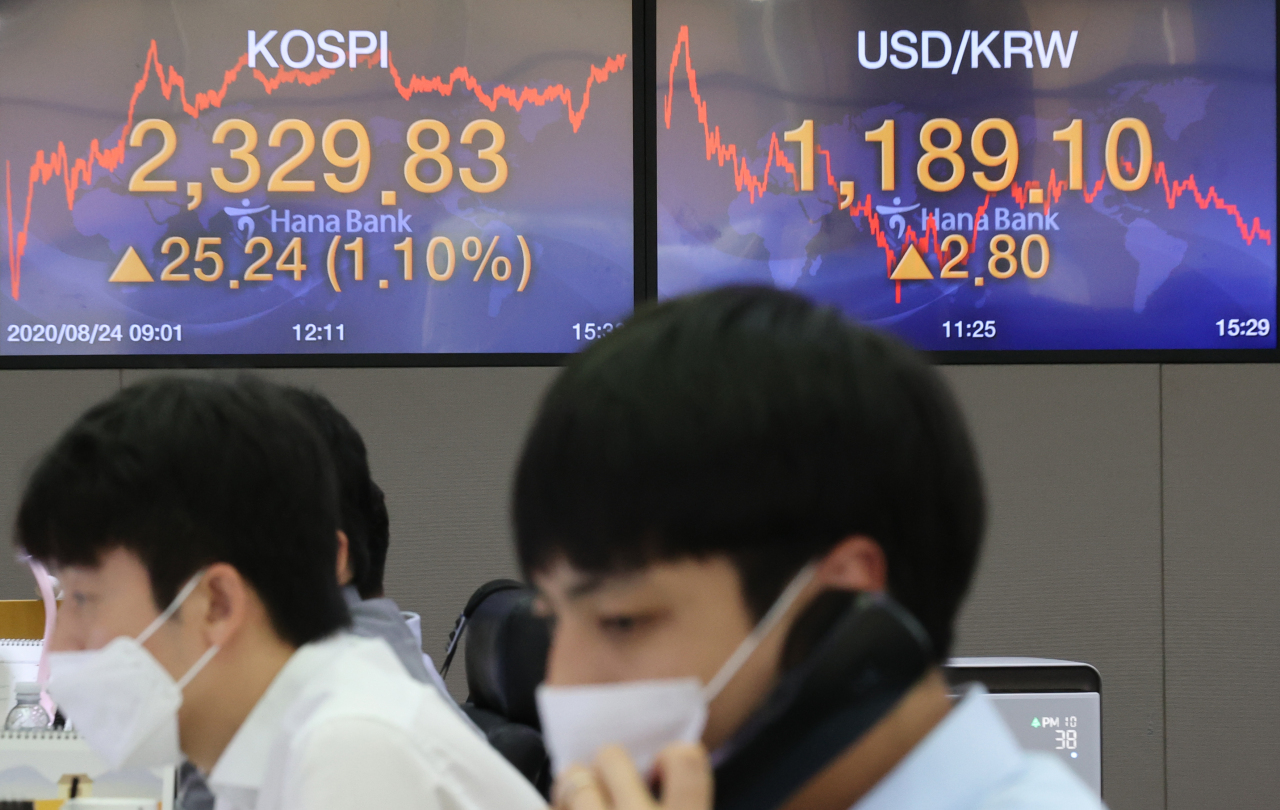 |
The benchmark Kospi closes at 2,329.83, a 1.10 percent increase from the previous session on Monday, amid growing fears over the resurgence of new coronavirus cases nationwide. (Yonhap) |
Despite wide fluctuations in South Korea’s stock market, along with a resurgence in novel coronavirus infections, foreign investment banks have painted a rosy outlook for the nation’s main bourse.
Swiss banking giant Credit Suisse has raised its yearly Kospi target to 2,600 from the previous estimate of 2,300, saying that exports have begun recovering as major economies ease COVID-19 lockdowns.
“The continuous weakened US dollar gives a boost to the Kospi index, improving short-term economic indicators are likely to bolster investor sentiments,” Park Ji-hoon, a senior researcher at the Swiss-based investment bank said.
Korea’s stock market could get a further boost from some firms’ better-than-expected performance in the second quarter, he noted.
Australia’s Macquarie Securities has also upgraded its outlook for Kospi to 2,400 points from 2,200. The bank had previously downgraded its forecast to 2,200 from 2,400, amid the COVID-19 fallout.
“We are still guarded about the COVID-19 pandemic impact on Korea’s macroeconomic structure. Considering rising liquidity and increased participation by retail investors, however, we’ve revised our Kospi target.”
Last month, HSBC raised its investment rating on Korea’s stock market from “neutral” to “overweight,” saying it offers “a good combination of strong growth and attractive valuations” via a report.
“With the easing of COVID-related restrictions and aggressive policy support globally, the market should benefit from a likely recovery in exports in the coming quarter,” the report said.
“We believe there might be a temporary outperformance of value over growth and Korea is a valued market that should benefit.”
In the meantime, local market watchers voiced concern that the local stock market may take another hit from tougher COVID-19 restrictions, which could put a damper on consumer spending and corporate results. But the volume of short-term floating capital has reached a new record high.
The amount of idle money, parked for proper investments in the stock market, reached nearly 52.64 trillion won ($44.22 billion) as of Thursday, according to data from the Korea Financial Investment Association. It renewed record highs for three consecutive sessions.
Amid growing concerns over a massive second wave of COVID-19 infections in the country, the Kospi tumbled 5.45 percent from Aug. 14 to Friday, which led the index to drop to the 2,270-level mark from the 2,430-level mark. Retail investors, meanwhile, net purchased 1.47 trillion won of stocks.
Retail investors went bargain hunting, scooping up some 1.07 trillion won worth of undervalued shares Thursday. In daily trading, the index plummeted 3.66 percent, recording the largest fall since June 15, when it sank 4.76 percent.
“There is high possibility that more retail investors’ idle funds may inflow to the stock market as their desire of buying undervalued assets gets bigger,” said Choi Yoo-june, an analyst at Shinhan Financial Investment.
“On the back of slashing interest rates on fixed deposit products to near-zero percent, stock investments have become more attractive for retail investors.”
By Jie Ye-eun (
yeeun@heraldcorp.com)








